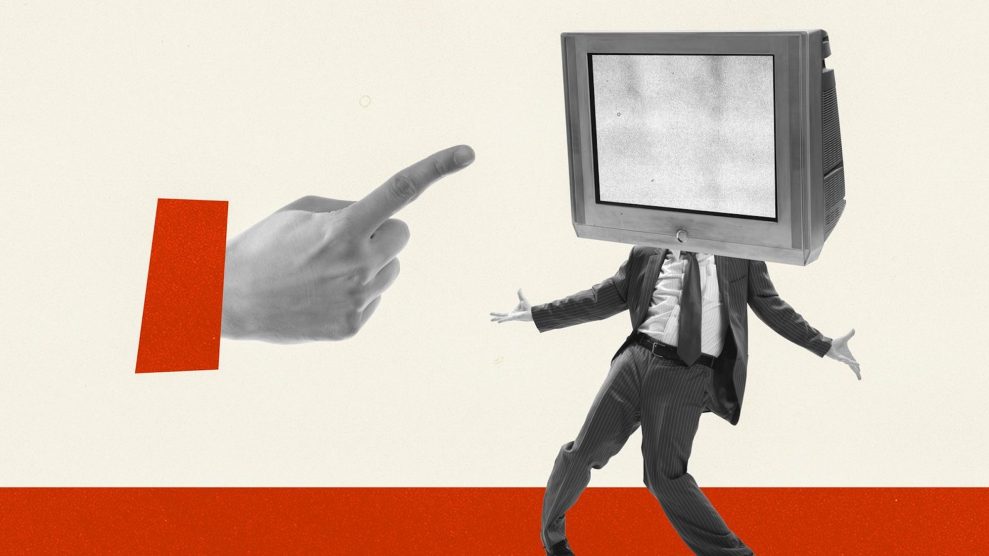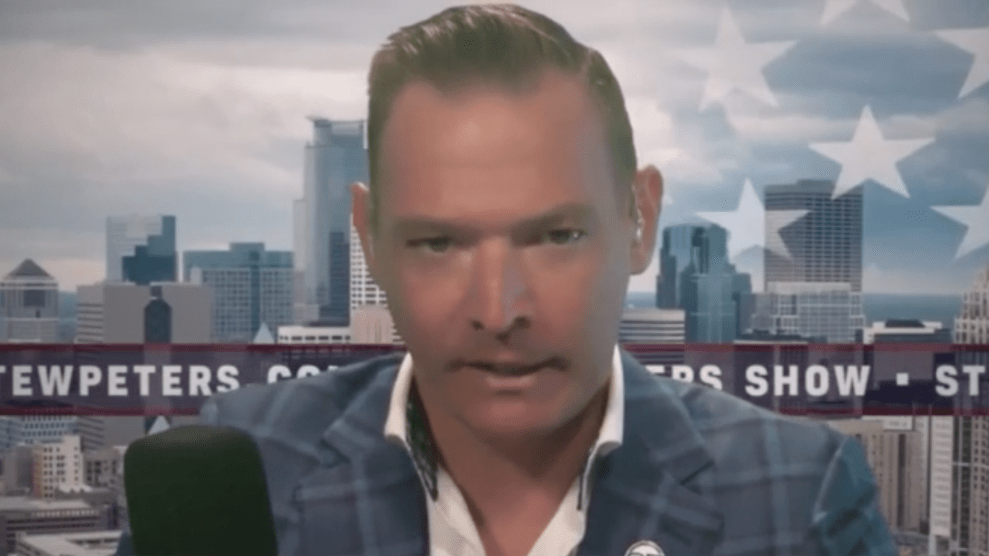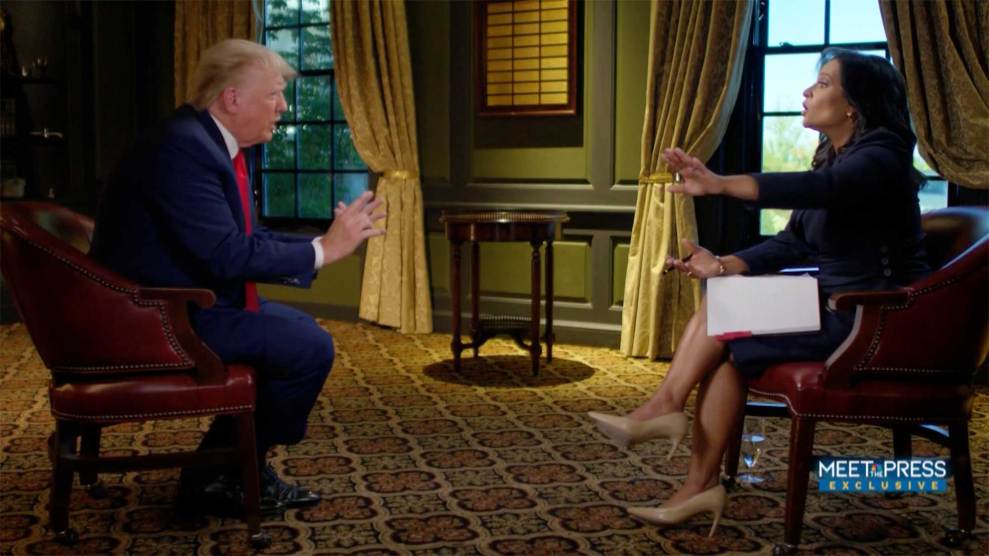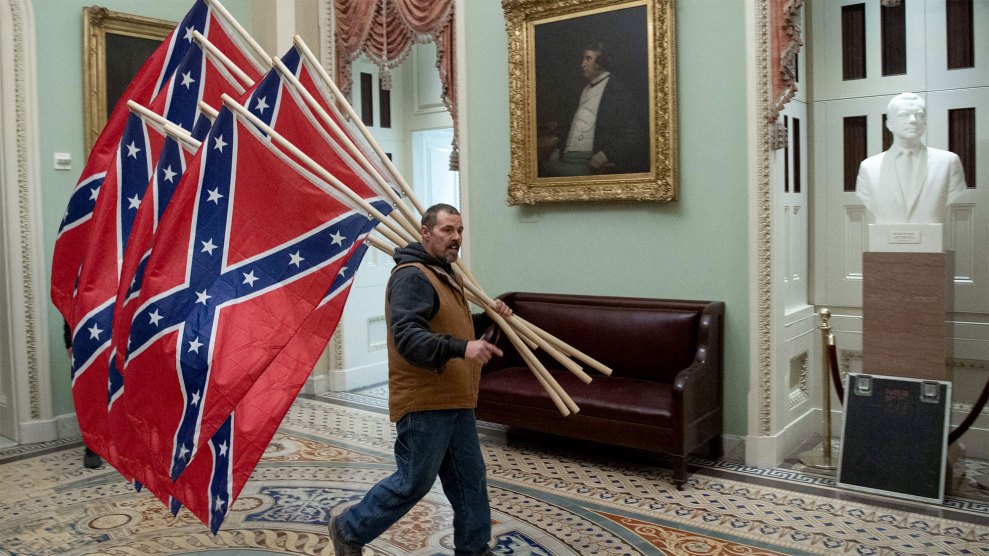
In These Times/Shutterstock
This article first appeared in InTheseTimes magazine’s special issue on the spread of the far Right.
“Violence is a part of America’s culture,” the Black Power militant H. Rap Brown once said. ”It is as American as cherry pie.”
Another equally American tradition is looking away from the problem when it comes from the Right.
As researchers have repeatedly found, the Right is where political violence in America overwhelmingly originates. According to the Center for Strategic and International Studies—an eminently respectable, bipartisan think tank—right-wing political violence accounted for more than 90 percent of all attacks or plots in the first half of 2020, far outpacing terrorism from any other source since 1990. And since 2020, it’s gotten increasingly worse. A Reuters investigation published in August found that U.S. political violence is worse than it’s been at any point since the 1970s. Of the 18 fatal acts of political terrorism they counted since the Jan. 6 insurrection, only one came from the “Left” (involving a Democratic county official who allegedly murdered a reporter investigating him for corruption).
But you would never know this from listening to the mainstream media for most of the past three decades. And as calls to violence metastasize into a routine component of Republican politics—as when former Arkansas Gov. Mike Huckabee made the H. Rap Brown-like declaration that, should criminal prosecutions of Donald Trump continue, 2024 will be the last U.S. election “decided by ballots rather than bullets”—that denial may soon be among the biggest problems we have.
Americans “hate each other enough to fantasize about killing one another, in cold blood, over political culture disagreements,” I wrote in the conclusion of my 2008 book, Nixonland. The book is about how the shape of those disagreements was forged in the crucible of the 1960s. The reviews were good, including a kind notice in the Washington Post. But the Post’s reviewer, Elizabeth Drew—a longtime Washington correspondent dating back to the Nixon era—took exception to that particular passage, about a divided America’s mutual hate. She thought the author “becomes carried away and pushes his theme too far.”
She must not have been reading what I was reading while I was finishing the book.
During a single month in 2007, a bomb was defused at an Austin, Texas, abortion clinic; a Liberty University student was arrested with napalm bombs he planned to use against people protesting Jerry Falwell’s funeral; the FBI raided a three-county, far-right Alabama terror ring that was plotting to massacre Mexican immigrants with a stockpile including 130 grenades and a rocket launcher; and an anti-immigrant militia member was apprehended at a rally in Washington, D.C., carrying an M1 rifle and a map with lines pointing to the speaker’s platform.
The problem might have been that my reviewer was getting her news from sources like the Post, which didn’t run a word on any of these foiled terrorist plots. I learned about them from “alternative” media. It’s a sad state of affairs for a nation when “alternative” translates to accurate and “mainstream” to blinkered.
This sort of mainstream media denial goes back a long way. After the Oklahoma City bombing, speculation that Muslim jihadists were responsible saturated mainstream media. New York Times columnist A.M. Rosenthal wrote, “Whatever we are doing to destroy Mideast terrorism, the chief terrorist threat against Americans, has not been working.” After news broke that a homegrown Christian was responsible for the bombing, mainstream voices still strained to blame anything except the Right’s gathering forces of hate against the federal government.
When the Post profiled Timothy McVeigh in 1995, it cited his parents’ divorce as one possible motivation for his terrorism—ignoring the fact that he was part of a movement that, by the mid-1990s, included more than 850 anti-government militia groups, and that its rhetoric was echoed by “mainstream” conservatives. In 1995, shortly before McVeigh’s attack, a National Rifle Association mailer excoriated federal agents as “jack-booted government thugs” who wear “Nazi bucket helmets and black storm trooper uniforms” as they “attack law-abiding citizens.” The prior summer, G. Gordon Liddy—who’d transformed himself from Watergate felon to one of the Right’s top talk radio stars—broadcast a show in which he advised listeners to “hunt down and kill” agents from the Bureau of Alcohol, Tobacco and Firearms with “head shots.”
At the museum in Oklahoma City that memorializes the bombing, a political cartoon on the wall encapsulates this denial: One reporter asks, “How many hurt?” Another answers, “260 million Americans”—the entire U.S. population in 1995. The crime, in other words, was to be understood as the product of forces entirely alien to American politics and its longstanding traditions.
That stubborn and dangerously naïve myth has a great deal to do with how unprepared the nation was for Jan. 6, 2021, from the police tasked with protecting the Capitol to the journalists who should have seen it coming.
Had the mainstream media done its job a decade earlier, when the Tea Party movement was sweeping the nation, things might have turned out differently.
That the media did a terrible job of explaining what the Tea Party was and how it functioned, right from its founding in the spring of 2009, is clear from the movement’s Wikipedia entry, which describes the Tea Party as focused on lower taxes, national debt and decreased government spending. That’s how the movement was almost universally reported, after all, on network news, in cable outlets like CNN and in newspapers like the New York Times and the Washington Post.
It’s also not true.
If Tea Party members had actually cared about lowering taxes, after all, they should have venerated Barack Obama, whose Making Work Pay tax cut, passed the first month of his presidency, promised lower income taxes by an average of $1,200 annually for the 97 percent of Americans who paid payroll taxes. If they cared about debt and the deficit, they shouldn’t have idolized Ronald Reagan, who sent both through the roof.
While the media depicted the Tea Party as nonideological—as one headline read, “Look to Your Left, Look to Your Right … Everyone Is a Tea Partier!”—it was, in reality, a classic reactionary formation that viscerally hated all forms of liberalism. The media credulously repeated poll findings that 40 percent of Tea Partiers called themselves “Independents,” omitting the fact that many refused to identify as Republican simply because they instead identified as John Birchers, Ron Paul supporters, or other factions beyond even the GOP’s fringe. The movement also was deeply intertwined with Stewart Rhodes’ far-right Oath Keepers.
Rhodes is now a federal prisoner, sentenced in May to 18 years for seditious conspiracy to overthrow the U.S. government in the January 6 plot. In 2008, Rhodes was a libertarian Yale Law School graduate, former Ron Paul campaign staffer and columnist at the survivalist magazine S.W.A.T. A retired Army colonel wrote a letter to S.W.A.T. proposing that active duty and retired military and police were the nation’s best defense against a New World Order takeover, to which Rhodes agreed. Rhodes’ column in response—warning that if “Hitlery” Clinton was elected, the government would “go house-to-house to disarm the American people and ‘black-bag’” anyone who resisted—was the seedbed of the Oath Keepers. When Obama won the Democratic nomination, Rhodes simply slotted Obama into the same scenario.
Rhodes held the Oath Keepers’ first “muster” on April 19, 2009, because it was the anniversary of the start of the American revolution—which was also the date McVeigh chose for his atrocity. There, law enforcement and military personnel pledged to refuse 10 specific orders should they be issued from their commanding officers, including “disarm[ing] the American people” and “subjugat[ing] any state that asserts its sovereignty and declares the national government to be in violation of the compact by which that state entered the Union” (a nice nod to slavery’s 19th-century defenders).
One of Rhodes’ first followers, Daniel Knight Hayden, had already been arrested for a series of tweets he posted eight days earlier, promoting a Tea Party rally scheduled for Tax Day at the Oklahoma State Capitol. The rally, Hayden suggested, would mark the opening salvo of a new civil war, in which he was “willing to be the FIRST DEATH.”
As the Tea Party grew, Rhodes became a fixture on its circuit, recruiting cops and soldiers as Oath Keepers from Tea Party rally stages. He received such a warm reception from this supposedly “fiscally centered” movement that he apparently couldn’t accommodate all of the requests for his appearance. That July 4, he sent dozens of surrogates across the country to speak in his name. One was a YouTube militia star, Charles Dyer (aka July4Patriot), who urged fellow veterans to use their military training to become “domestic terrorists.” When Dyer was arrested in January 2010 for raping his 7-year-old daughter, authorities found an arsenal in his home that included a grenade launcher pilfered from a military base.
This militia/Tea Party convergence was an important story, you might think. But it’s not one you could find in mainstream media. In the Tea Party’s first year, the New York Times gave it saturation coverage; one of its reporters even published a book about the movement. But the Times noted the Oath Keepers only once in its news pages, and in passing.
CNN covered the Oath Keepers more frequently—but seemed almost to celebrate it. Correspondent Jim Acosta, who appeared to find Rhodes charming, teased his report from the Oath Keepers’ 2010 Las Vegas convention as an introduction to “a group of soldiers … that believes their allegiance to the Constitution is what’s front and center.” He reassuringly concluded: “They’re not really a militia.”
You had to turn to alternative media to go deeper.
When Mother Jones’ Justine Sharrock covered the same 2010 Oath Keepers convention, she reported how the group was planning to take over the Tea Party from what they termed “asshole RINOs.” Sharrock also found that, far from being a mere Constitution-lover, one featured speaker was a leader of a movement claiming county sheriffs have the power to contravene federal law. In upstate New York’s Fort Drum, Sharrock reported on a young soldier who spent his off-hours drilling his six-man Oath Keepers cell so they would be prepared to fight fellow soldiers who had not yet awakened to the threat when the time came, which he was sure would be soon.
When Sharrock reminded the soldier that Rhodes’ oath was a call to refuse tyrannical orders rather than wage civil war—to lay down weapons, not take them up—the soldier told her to “read between the lines”: “They have to be careful because otherwise they will be labeled as terrorists.”
In 2011, In These Times ran a dispatch noting that Flathead Valley, Mont.—the Oath Keepers’ home base—was becoming a refuge for violent far-right insurrectionists who overlapped with the state’s “particularly virulent Tea Parties.” In an online discussion about the murder of gay University of Wyoming student Matthew Shepard, In These Times reported, the president of one local Tea Party group requested an “instruction manual.”
By 2022, a year after the January 6 attacks, Acosta had become a primetime CNN anchor. He teased the following story: “Federal prosecutors are presenting new evidence to a jury that Oath Keepers founder Stewart Rhodes called for a, quote, ‘bloody war’ to keep then-President Trump in office after his 2020 election defeat.”
In a different timeline, in which Acosta and his mainstream media colleagues did a better job a decade prior, maybe that story would’ve had a different ending.
The man perhaps most responsible for building and sustaining the lunacy that produced January 6—the one individual who embodies the overlap between Tea Party and Oath Keepers—was hiding in plain sight, every night on Fox News. Glenn Beck’s primetime preachments of the dark liberal conspiracy to undermine the United States were uncannily similar to Rhodes’ Oath Keepers arguments. Most importantly, Beck was himself a Tea Party hero. In one poll, 25 percent of the movement’s adherents named Beck the figure they trusted most—their Walter Cronkite, if Walter Cronkite had his own political organization.
Beck’s political organization was the (now defunct) 9/12 Project. One of its organizers was a woman named Nighta Davis, who believes abortion is part of a plot to eugenically eliminate Christians. Davis was at the 2010 Oath Keepers convention—as Mother Jones reported but CNN did not—planning a program of outreach to the mainstream Right, which culminated in meetings attended by several members of Congress and former Christian Coalition head Ralph Reed.
On Sept. 12, 2009, Beck held a massive “tea party” on the National Mall. Rhodes was on its planning committee, and his Oath Keepers were there in force.
The next summer, Beck published The Overton Window, a book depicting a cartel from the highest echelons of business, politics and the military plotting a totalitarian coup. The first step was brainwashing the masses with concepts like “social justice” and “the common good,” then expanding the “malleable voter base and agenda support by granting voting rights to prison inmates, undocumented migrants and select U.S. territories, e.g. Puerto Rico.” Then, after their Reichstag fire—obliterating Las Vegas by nuclear bomb—Americans would be too spiritually denuded to resist. Except, of course, the brave cadres of a group that suspiciously resembled Beck’s 9/12 Project, who save the world just in time.
Beck called the book a novel. But in an afterword he detailed how aspects of the plot had already taken place and instructed readers to think of the book as training, the way “fighter pilots often use flight simulators to train for real combat.” On Independence Day 2010, the book debuted at the top of the New York Times bestseller list.
Two weeks later, a Beck fan named Byron Williams engaged in a shootout with police, who picked him up for speeding on his way to San Francisco to “start a revolution” by murdering employees of the Tides Foundation and the ACLU—nodes on Beck’s infamous conspiracy chalkboard. Kenneth B. Kimbley—arrested around the same time for building homemade grenades in preparation for when “the government started rounding up the patriots”—was another Beck fan, as his lawyer noted in his defense: He’d just been following what his idol “typically states on the air.”
Had mainstream media ignored Beck? Hardly. Ten months earlier, Time magazine had Beck on its cover, calling him “a gifted storyteller with a knack for stitching seemingly unrelated data points into possible conspiracies—if he believed in conspiracies, which he doesn’t, necessarily; he’s just asking questions.”
A jocular profile, accompanied by a jocular portrait: Beck blowing a raspberry at the reader. He was “the hottest thing in the political-rant racket,” a talented “entrepreneur of angst” who “lit up the 5 p.m. slot in a way never thought possible.” As politics, Time noted, it was “sort of a train wreck—at once powerful, spellbinding and uncontrolled.” But as “melodrama,” it was “thumping good stuff.”
It’s worth noting that part of that thumping good stuff—both from Beck’s oeuvre and Rhodes’ movement—was a prediction of the cunning pretext the bad guys would use to rob American patriots of their liberties, their fortunes and their guns: a pandemic. You may recall that a foundational argument of 2020 election deniers was that Democratic states used Covid-19 as a pretext to change election rules to Joe Biden’s benefit.
And that completes the story mainstream media missed: More than a decade ago, a cadre of armed military and police personnel took an oath rooted in a conspiracy theory that a globalist cabal was working to steal Americans’ democratic birthright. That narrative was then mainstreamed on the most-watched “news” show on cable TV. And then a Republican presidential candidate exploited the narrative to mobilize a citizen army to steal back the White House after losing the election.
Now, nearly three years later, what should we expect the media establishment to have learned from missing an origin story of January 6? That much of Trump’s constituency understands violence as a central tool for achieving their political aims.
But has the media learned it?
This September, in Española, N.M., as Indigenous activists protested the reinstallation of a statue honoring a conquistador, a man in a MAGA hat named Ryan Martinez allegedly started shooting. One of the activists, a Hopi man named Jacob Johns, was shot and required emergency surgery. When investigators questioned Martinez, he began laughing. He asked whether the police could just let him go.
You can read all about the shooting in the Guardian, but the New York Times did not find the story fit to print. The Washington Post waited over a month. I wonder if anyone in either newsroom understands this sort of thing as an urgent part of the story of the 2024 elections.
Forces are gathering on the Right that see their political aspirations as something worth killing for. When the likes of Mike Huckabee proudly announce the idea of bullets over ballots as an inevitability, media that omit the mounting potential for political violence from their political coverage are abdicating basic journalistic responsibility. It’s certainly as important as totting up who can be expected to caucus for whom in Iowa, or who’s winning over Virginia’s soccer moms.
Horse-race reporting has its place. But it won’t matter much if the men in the MAGA hats blow up the horse track.















